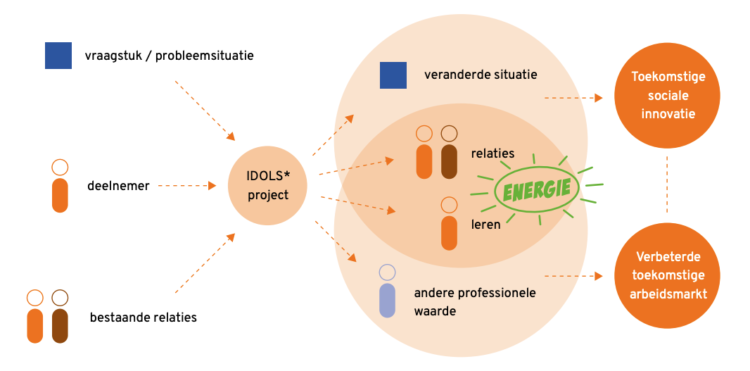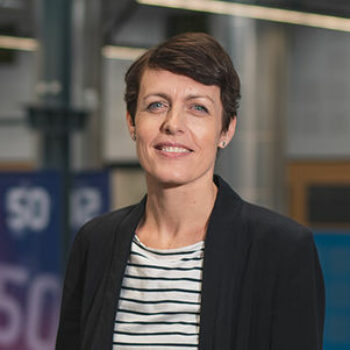Project IDOLS* – Expanding the job market in the creative & cultural sector
Within the IDOLS*-program, complex societal challenges were tackled in an innovative and creative way. This is often referred to as ‘social innovation’. Ten consortia, consisting of on the one hand problem owners and on the other hand contractors from the cultural and creative industries, were supported for about one year to collectively tackle a societal challenge. This support consisted of financial support, coaching by an experienced social innovator, and events in which learning experiences were shared.
Continuous social innovation is required to address complex societal challenges that cannot be solved within one project. Consequently, the impact of complex societal multi-stakeholder projects has to be seen in relation to the influence of the outcomes of the project on the formation and execution of possible follow-up projects in the future. The research approach consisted of seventeen in-depth interviews with coaches and secretaries of all ten executed projects, the formulation of a value-framework to assess the positive impact of the ten projects, and a questionnaire which was completed by 50 respondents.
The research approach consisted of seventeen in-depth interviews with coaches and secretaries of all ten executed projects, the formulation of a value-framework to assess the positive impact of the ten projects, and a questionnaire which was completed by 50 respondents.
- Which outcomes of the IDOLS*program contribute to the expansion of work opportunities for the cultural and creative industries and to continuous social innovation?
- What we can learn from how consortia collaborated and how participants learned together within the IDOLS*-projects?
- How the structure of the IDOLS*-program contributed to the experienced produced value of the projects and to the way that projects unfolded?

Summarized conclusions
Many of the findings of this study consider the optimization of learning experiences. Participants embarked on a learning journey about the shaping of roles, their own role within social innovation, collaboration in multi-stakeholder projects, and the creative process. Aspects of the IDOLS*-program that contribute to learning are:
- to participate in a project with many different project members;
- the support of a coach, and;
- participating in events that stimulated peer-learning.
Potential for further deepening of learning experiences can be found in stimulating more diversity and collaboration within consortia, actively engaging problem owners in the projects and the learning community, and stimulating learning between projects, not just within projects. For this purpose, it is recommended to set up a learning infrastructure in addition to the coach role. A learning infrastructure consists of the methods and techniques, environment, services, technology and tools that promote to learn together, for example reflexive monitoring or a community of practice.
The societal impact of the projects could not be assessed. However, the learning goals in relation to collaboration and finding a role within social innovation, as well the strengthened relationships and networks within IDOLS*, will contribute positively to future social innovation project and programs, and as a result to continuous social innovation. In addition, it was not only found that learning outcomes and new relationships are of importance, but also – and in this case particularly – the energy and motivation that was generated within the projects. This is a very valuable outcome from the perspective of continuous social innovation.
Authors: Dr. Ir. Mieke van der Bijl-Brouwer, Ir. Marie van den Bergh, Ir. Eva Legemaate, Dr. Ir. Jotte de Koning
